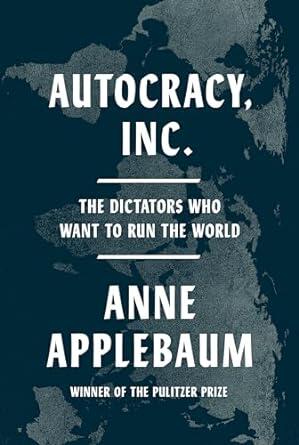Freedom is on the march around the world.

Unfortunately, it's marching in retreat. For the 18th straight year, global freedom declined, according to Freedom House, a D.C.-based nonprofit. Its latest annual report shows that civil liberties declined in more than 50 countries, while fewer than half that many nations saw gains in these areas.
The growing ranks of nondemocratic countries run the gamut, from the "Hermit Kingdom" of North Korea to the theocracy of the Islamic Republic of Iran to the crumbling petrostate of Venezuela. Putin's Russia and Xi's China are, of course, also in the mix. In Anne Applebaum's Autocracy, Inc., released July 24, the journalist, historian, and senior fellow at the SNF Agora Institute at Johns Hopkins reveals a growing and dangerous unity among such authoritarian states.
"The argument in my book is that they don't have anything in common ideologically," she says. "They don't have identical backgrounds." What unites them, she says, is their dislike of "us"—the United States and our democratic allies. "They're joined by their determination to undermine both the language and the reality of liberal democracy," she adds.
As she puts it in the book, there is "no secret room where bad guys meet, as in a James Bond film." Rather, we face a shifting confederacy of kleptocracies engaged in various degrees of cooperation, such as corrupt state-run companies doing business together and police and military forces sharing resources. (Russia utilizes Iranian drones in Ukraine; Cuba installs Chinese surveillance technology.) Meanwhile, authoritarian state propaganda efforts, from bot farms to slick media operations, increasingly work in tandem. "I didn't quite understand the degree to which the information war is coordinated until I began to dig into it more deeply," Applebaum says. "The Chinese are now promoting Russian propaganda, and vice versa. Iranians, Venezuelans, and many autocratic states in Africa use the same language and repeat one another's narratives."
How did we land here? During the Cold War, global power and influence were largely divided between capitalist democracies and communist dictatorships. As Russia and other nations emerged in the post–Cold War landscape, the West began to bring them into the global economic fold by doing business and trade with them. But there were unintended consequences. Some disreputable operators learned not just how to operate within the capitalist system but how to cheat it, as well. "It exposed them to the soft underbelly of our financial system—the tax havens, the money laundering operations," Applebaum says. "That was a huge benefit to the autocracies. Russia was really the first to discover it, but then many others copied them and still do."
Meanwhile, the expanding internet was viewed at the time as a tool to promote freedom and global unity. "Our assumption was that the internet would make autocracy impossible because it would bring in all kinds of information, but the Chinese—and of course, later on, many others—figured out how to control information so that it became a tool of authoritarianism." (Facebook and X are banned in China, but so, too, is TikTok, which was created by a Chinese company.)
Economic sanctions are the primary tool used to isolate and weaken rogue autocracies, though their effectiveness is waning, Applebaum writes. And such measures can also lead to an unintended consequence: an emerging alliance of sanctioned countries. "Iran and Venezuela, which are not countries that had anything to do with each other historically, now have this very close relationship because they're both under sanctions and assist one another in avoiding them," Applebaum says.
Autocracy, Inc. brings into focus what we in the West are up against and can make for grim reading. But the book's dedication page reads "For the optimists," and the final chapter outlines some steps toward fighting and dismantling autocratic networks, such as adding greater transparency to international financial and real estate transactions (fewer oligarchs docking megayachts outside their seaside penthouses). We can also focus our intelligence services on discovering and disarming disinformation campaigns before they launch, and bring better regulation to the disinformation stew that is social media. Do we have the political will to remain democracy's global champion? To stand with our allies and stare down our foes? That remains to be seen.
"American power and influence come from our alliances because we're seen as a trustworthy leader," Applebaum says. "We have influence in parts of the world that we otherwise wouldn't have, and we have an ability to make things happen that other countries don't have. Abandoning that huge advantage would be a terrible mistake."






